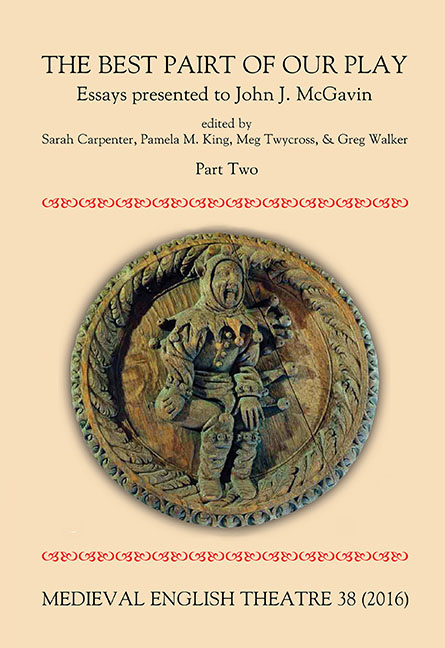 Medieval English Theatre 38
Medieval English Theatre 38 Book contents
- Frontmatter
- Contents
- Editorial
- The Funeral of Walter Scott, First Earl of Buccleuch: A Grand Ceremonial Occasion
- The Bright Star of the North: James I and his English Coronation
- ‘Ye know eek that in forme of speche is change’: Chaucer, Henryson, and the Welsh Troelus a Chresyd
- Playing the Crucifixion in Medieval Wales
- ‘My Boy shall Knowe Himself from Other Men’: Active Spectating, Annunciation, and the St John's College Narcissus
- ‘I Speke so Miche to Ȝow’: Authority, Didacticism, and Audience Address in Middle English Sermons and Morality Plays
- Early English Spectatorship and the ‘Cognitive Turn’
- The Theatre of the Mind in Late-Medieval England
- Poetics and Beyond: Noisy Bodies and Aural Variations in Medieval English Outdoor Performance
- Women and the Performance of Libel in Early-Modern
- Abraham Sacrifiant
- Miscellaneous Endmatter
Poetics and Beyond: Noisy Bodies and Aural Variations in Medieval English Outdoor Performance
Published online by Cambridge University Press: 20 April 2017
- Frontmatter
- Contents
- Editorial
- The Funeral of Walter Scott, First Earl of Buccleuch: A Grand Ceremonial Occasion
- The Bright Star of the North: James I and his English Coronation
- ‘Ye know eek that in forme of speche is change’: Chaucer, Henryson, and the Welsh Troelus a Chresyd
- Playing the Crucifixion in Medieval Wales
- ‘My Boy shall Knowe Himself from Other Men’: Active Spectating, Annunciation, and the St John's College Narcissus
- ‘I Speke so Miche to Ȝow’: Authority, Didacticism, and Audience Address in Middle English Sermons and Morality Plays
- Early English Spectatorship and the ‘Cognitive Turn’
- The Theatre of the Mind in Late-Medieval England
- Poetics and Beyond: Noisy Bodies and Aural Variations in Medieval English Outdoor Performance
- Women and the Performance of Libel in Early-Modern
- Abraham Sacrifiant
- Miscellaneous Endmatter
Summary
Pilate opens the Tapiters and Couchers Guild's pageant of Christ before Pilate I in the York Corpus Christi Play by asserting himself acoustically. His manner of delivery both grabs the attention of the audience, and establishes him as one of the Play's ranting tyrants. The whole ensuing pageant is redolent with references to sound. After splitting the ears of the audience, Pilate settles down to sleep, instructing his Beadle to ensure that ‘no myron of myne’ should ‘With no noyse be neghand me nere’ (30: 138–9), to which the Beadle assures him that ‘what warlowe yow wakens with wordis full wilde, | Þat boy for his brawlyng were bettir be vnborne’ (139–40). Pilate's rejoinder is ‘Yha, who chatteres, hym chastise, be he churle or childe …’ (142), and, in case we haven't got the message:
Yf skatheles he skape it wer a skorne. What rebalde þat redely will rore, I schall mete with þat myron tomorne, And for his ledir lewdenes hym lerne to be lorne.
30: 144–7A maid and the son help Pilate's wife Procula to bed. She says ‘Nowe be yhe in pese, both youre carpyng and crye’ (157). This is immediately followed by Diabolus bursting on the scene with the extra-metrical line 157a, ‘Owte! Owte! Harrowe!’ The intrusion occurs within Procula's dream — so the unconscious mind is as noisy as the conscious. As she wakes in a panic, her servant complains of being noisily awoken by her. In the meantime the party escorting Jesus wakens Pilate's Beadle with their noise, and he complains about that (232–5). The Beadle shouts to Pilate, who wakens with ‘Howe!’ (255). Caiaphas has just apologised for waking him up when the boy bursts in with the message from Procula. He describes her dream in the same terms as she did to him earlier: ‘With tene and with traye was sche trapped’ (286). It has been a noisy night thus far in the Pilate household, and we are by now accumulating a virtuoso alliterative vocabulary for unwelcome noisemaking.
Pilate's Beadle, lately rudely awoken by the arrival of the Jewish priests, spontaneously kneels to Jesus. He explains his action by recounting the experience of being present at the Entry into Jerusalem, another aural experience: ‘“Osanna”, þei sange, “þe sone of Dauid”’ (343). He is warned by Annas, ‘thy tonge schulde þou holde’ (359).
- Type
- Chapter
- Information
- Medieval English Theatre 38The Best Pairt of our Play. Essays presented to John J. McGavin. Part II, pp. 129 - 144Publisher: Boydell & BrewerPrint publication year: 2017


